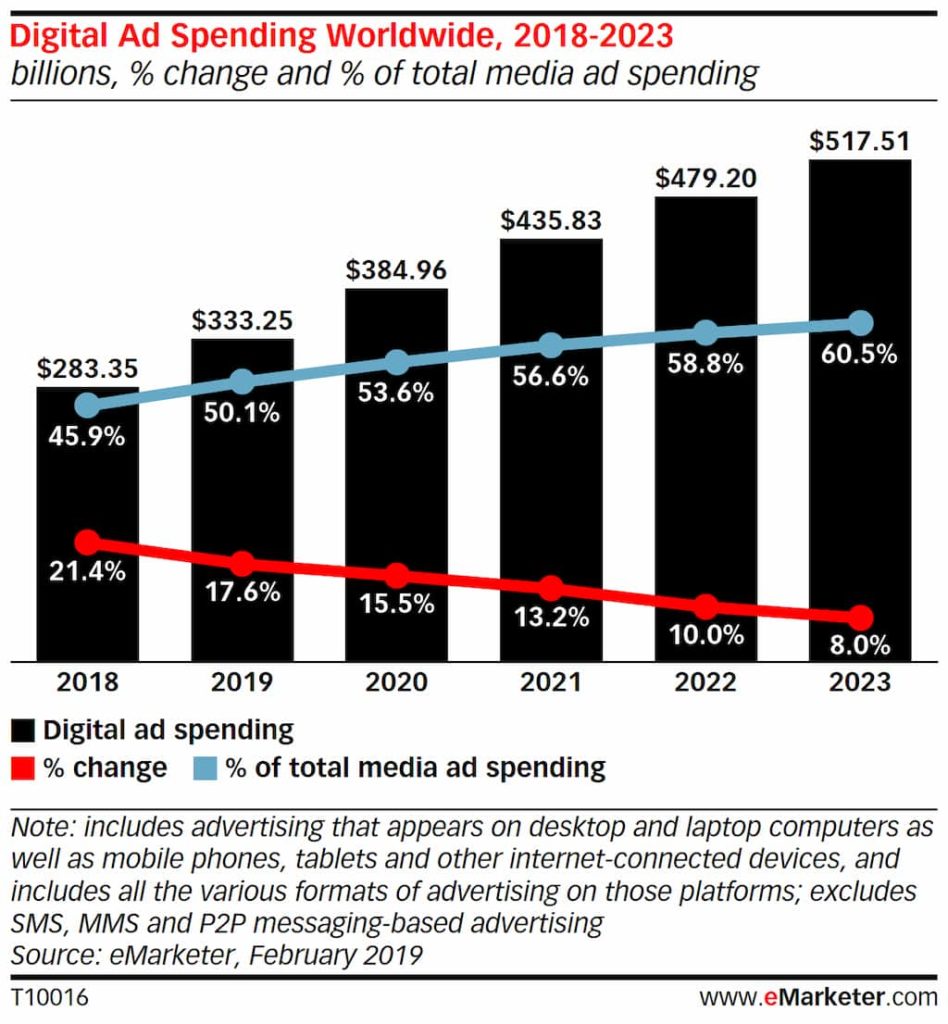Digital marketing is one of the fastest-growing markets all over the world. When a business switches online, it needs an online marketer who will promote it on the internet. The global digital ad spend is expected to cross $500 billion by 2023:

With an average salary of $107,100 across all digital marketing roles, there isn’t any better career opportunity. It is a lucrative career choice with numerous career paths and growth opportunities. Getting into digital marketing isn’t a big task as long as you know what education, experience, skills, and certifications you need.
1. Education
Most of the potential candidates are of the view that having a marketing degree is necessary to get into digital marketing. However, this isn’t the case. According to a survey, 89% of marketers say that a formal degree isn’t necessary to get a job:
You can get into digital marketing without a degree and this is great news for all those who don’t have a formal degree. But yes, having a degree makes a lot of impact.
If you can afford it, get a degree in marketing or any relevant discipline. It will help you throughout your digital marketing career. You can enroll in an online part-time degree that you can complete from your home.
If you can’t afford a degree, you can take specific digital marketing online courses. Coursera and edX are the best places where you’ll find reputable digital marketing courses. You’ll find lots of free courses on these two platforms.
A digital marketing course is best in the sense that it is cost-effective and provides you with practical digital marketing knowledge that is helpful in getting a job quickly.
2. Choose a Specialty
Digital marketing is very broad. It includes everything ranging from social media marketing to blogging to affiliate marketing and beyond:
You need to pick your specialty by selecting a single digital marketing channel. You can choose content marketing, email marketing, marketing automation, SEO, growth hacking, or any other. In reality, you can’t master everything within the digital marketing space, it is gigantic.
When you choose a specialty, it has several benefits:
- You can focus on your core specialty
- Your chances of getting hired increases significantly
- It gets easier to grow your portfolio for your desired specialty
- Businesses love working with specialists instead of a jack of all trades.
Choose your specialty based on your interest from the following list:
- Email marketing
- Search engine optimization
- Online advertising
- Social media marketing
- Content marketing
- Mobile marketing
- Growth hacking.
You need to become an expert in one of these fields and this is the best way to get into digital marketing.
3. Acquire Skills
Once you have finalized your digital marketing specialty, you need to develop the appropriate skills that are necessary for it. This includes both hard and soft skills:
Hard skills are related to your specialty and are easy to acquire. For example, if your specialty is content marketing, you must have writing skills, language proficiency, keyword research, copywriting skills, interviewing skills, the ability to use content marketing tools, etc.
You can acquire and polish these hard skills with practice.
Soft skills, on the other hand, are social skills that are hard to acquire and are mostly referred to as people skills. Research shows that soft skills account for 85% of job success, you can’t ignore them:
If you want to become a successful digital marketer, you must master soft skills. The most common soft skills include:
- Communication
- Collaboration
- Teamwork
- Interpersonal
- Problem-solving
- Adaptability
- Self-awareness
- Leadership
- Time management
- Analytical.
It is hard to show that you possess a certain soft skill. These are more associated with your personality and traits. You can improve your soft skills with training and development e.g. communication skills can be improved with training and practice.
4. Develop Your Portfolio
Your portfolio is the most important variable that plays a major role in getting you into digital marketing. A marketing portfolio is your best asset that highlights your achievements, skills, projects, case studies, and more.
Here is an example of a marketing portfolio:
Here is what your portfolio must have:
- Resume
- Bio
- Contact details and website/blog URL
- Best work examples and/or case studies
- Testimonials
- Certifications and awards.
As a new digital marketer, you might not have work examples and testimonials – and it is absolutely OK. You don’t have to add any fake work experience.
If you have worked on a project in your college, during your degree, or during a certification, add it as work experience. You can also create your own case studies by working on your personal projects.
For example, if your specialty is content marketing, you can publish content on your personal website and improve its organic traffic and SERPs by incorporating content marketing techniques you know. Monitor traffic and create a case study.
This technique works best as clients are interested in case studies as it gets easier for them to understand your capabilities.
5. Learn and Evolve
Digital marketing evolves and changes rapidly. The marketing techniques that work today might not work after a few months. There are several factors that influence digital marketing such as Google algorithm, ad networks, privacy policies, data collection techniques, marketing channels, new technologies, and more.
You must continue learning new skills. Grow and evolve in your specialty. Don’t rely on what you know rather continue learning and growing your skillset. You can do this by taking new courses, certifications, and surrounding yourself with the right people.
Start Applying
You are ready to kickstart your digital marketing career. Use LinkedIn, Glassdoor, Indeed, and other platforms to find digital marketing jobs in your specialty. Write a killer cover letter and start applying for jobs that you qualify for.
Don’t forget to explore digital marketing vacancies on Twitter and Google. Not all companies post a formal job vacancy on a job portal. Most of them just tweet about it while others put it on your website. Running relevant search queries on Google and Twitter will show several digital marketing posts.
As a new digital marketer, look for entry-level jobs including internships. Internships provide you a great opportunity to get experience and build your portfolio.
Featured Image: Pexels






